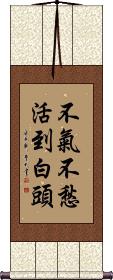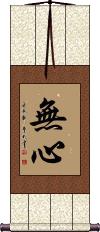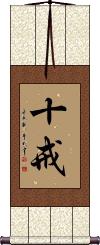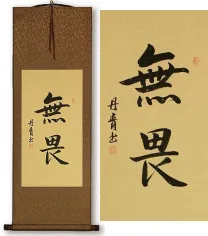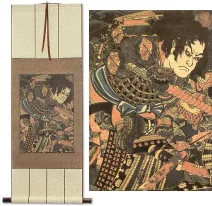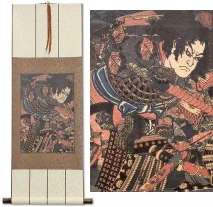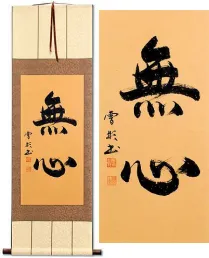Many custom options...
And formats...

No Anger in Chinese / Japanese...
Buy a No Anger calligraphy wall scroll here!
Personalize your custom “No Anger” project by clicking the button next to your favorite “No Anger” title below...
Freedom from Anger and Worry Yields Longevity
No Mind / Mushin
In Japanese, 無心 means innocent or without knowledge of good and evil. It literally means “without mind.”
無心 is one of the five spirits of the warrior (budo) and is often used as a Japanese martial arts tenet. Under that context, places such as the Budo Dojo define it this way: “No mind, a mind without ego. A mind like a mirror which reflects and dos not judge.” The original term was “mushin no shin,” meaning “mind of no mind.” It is a state of mind without fear, anger, or anxiety. Mushin is often described by the phrase “Mizu no Kokoro,” which means “mind like water.” The phrase is a metaphor describing the pond that clearly reflects its surroundings when calm but whose images are obscured once a pebble is dropped into its waters.
This has a good meaning in conjunction with Chan / Zen Buddhism in Japan. However, out of that context, it means mindlessness or absent-mindedness. To non-Buddhists in China, this is associated with doing something without thinking.
In Korean, this usually means indifference.
Use caution and know your audience before ordering this selection.
More info: Wikipedia: Mushin
Ten Commandments
十戒 means Ten Commandments or Ten Precepts.
In the Buddhist context, these are prohibitions consisting of five commandments for the layman:
1. Not to destroy life 不殺生 Pāṇātipātāveramaṇi.
2. Not to steal 不倫盜 Adinnādānāver.
3. Not to commit adultery 不婬慾 Abrahmacaryaver.
4. Not to lie 不妄語 Musāvādāver.
5. Not to take intoxicating liquor 不飮酒 Suramereyya-Majjapamādaṭṭhānāver.
The ten commandments for the monk are the preceding five plus:
6. Not to eat food outside of regulated hours 不非時食 Vikāla-Bhojanāver.
7. Not to use garlands or perfumes 不著華鬘好香塗身 Mālā- Gandha-Vilepana-Dhāraṇa-Maṇḍana-Vibhūṣanaṭṭhānā.
8. Not to sleep on high or broad beds (chastity) 不坐高廣大牀 Uccāsayanā-Mahāsayanā.
9. Not to take part in singing, dancing, musical or theatrical performances 不歌舞倡伎不往觀聽 Nacca-Gīta-Vādita-Visūkadassanāver.
10. To refrain from acquiring uncoined or coined gold, or silver, or jewels 不得捉錢金銀寶物 Jātarūpa-Rajata-Paṭīggahaṇāver.
These original Buddhist commandments date back to about 2500 years ago. The English definitions above are followed by Chinese characters and original Pali pronunciation.
Under the Māhayāna Buddhism, these ten commands for the monk were changed, to accord with the new environment of the monk, to the following: not to kill, not to steal, to avoid all unchastity, not to lie, not to slander, not to insult, not to chatter, not to covet, not to give way to anger, to harbor no skepticism.
This in-stock artwork might be what you are looking for, and ships right away...
Gallery Price: $108.00
Your Price: $59.88
Gallery Price: $108.00
Your Price: $59.88
Gallery Price: $79.00
Your Price: $43.88
Gallery Price: $61.00
Your Price: $33.88
Gallery Price: $61.00
Your Price: $33.88
Not the results for no anger that you were looking for?
Below are some entries from our dictionary that may match your no anger search...
| Characters If shown, 2nd row is Simp. Chinese |
Pronunciation Romanization |
Simple Dictionary Definition |
十戒 see styles |
shí jiè shi2 jie4 shih chieh jukkai じゅっかい |
More info & calligraphy: Ten Commandments(1) (Buddhist term) the 10 precepts; (2) Ten Commandments; Decalogue; Decalog; (surname) Jukkai Śikṣāpada. The ten prohibitions (in Pāli form) consist of five commandments for the layman: (1) not to destroy life 不殺生 pāṇātipātāveramaṇi; (2) not to steal 不倫盜 adinnādānāver; (3) not to commit adultery 不婬慾 abrahmacaryaver.; (4) not to lie 不妄語musāvādāver.; (5) not to take intoxicating liquor 不飮酒 suramereyya-majjapamādaṭṭhānāver. Eight special commandments for laymen consist of the preceding five plus: (6) not to eat food out of regulated hours 不非時食 vikāla-bhojanāver.; (7) not to use garlands or perfumes 不著華鬘好香塗身 mālā- gandha-vilepana-dhāraṇa-maṇḍana-vibhūṣanaṭṭhānā; (8) not to sleep on high or broad beds (chastity) 不坐高廣大牀 uccāsayanā-mahāsayanā. The ten commandments for the monk are the preceding eight plus: (9) not to take part in singing, dancing, musical or theatrical performances, not to see or listen to such 不歌舞倡伎不往觀聽 nacca-gīta-vādita-visūkadassanāver.; (10) to refrain from acquiring uncoined or coined gold, or silver, or jewels 不得捉錢金銀寶物 jātarūpa-rajata-paṭīggahaṇāver. Under the Māhayāna these ten commands for the monk were changed, to accord with the new environment of the monk, to the following: not to kill, not to steal, to avoid all unchastity, not to lie, not to slander, not to insult, not to chatter, not to covet, not to give way to anger, to harbour no scepticism. |
五障 see styles |
wǔ zhàng wu3 zhang4 wu chang goshou / gosho ごしょう |
(1) {Buddh} five hindrances (that prevent a woman from becoming a Buddha, a Brahmā, a Shakra, a devil king, or a wheel-turning king); five obstructions to women's attainment; (2) {Buddh} five hindrances (that impede ascetic practices; sensory desire, ill-will, sloth and torpor, restlessness and worry, doubt) The five hindrances, or obstacles; also 五礙; 五雲. I. Of women, i. e. inability to become Brahma-kings, Indras, Māra-kings, Caikravarti-kings, or Buddhas. II. The hindrances to the five 五力 powers, i. e. (self-) deception a bar to faith, as sloth is to zeal, anger to remembrance, hatred to meditaton, and discontent to wisdom. III. The hindrances of (1) the passion-nature, e. g. original sin; (2) of karma caused in previous lives; (3) the affairs of life; (4) no friendly or competent preceptor; (5) partial knowledge. |
己れ see styles |
onore おのれ |
(pn,adj-no) (1) (archaism) oneself (itself, etc.); (2) (humble language) I; me; (3) (derogatory term) you; (adverb) (4) by oneself (itself, etc.); (interjection) (5) interjection expressing anger or chagrin |
忿怒 see styles |
fèn nù fen4 nu4 fen nu funnu ふんぬ |
variant of 憤怒|愤怒[fen4 nu4] (n,adj-no,vs) anger; rage; resentment; indignation; exasperation Anger, angry, fierce, over-awing: a term for the 忿王 or 忿怒王 (忿怒明王) the fierce mahārājas as opponents of evil and guardians of Buddhism; one of the two bodhisattva forms, resisting evil, in contrast with the other form, manifesting goodness. There are three forms of this fierceness in the Garbhadhātu group and five in the Diamond group. |
憤怒 愤怒 see styles |
fèn nù fen4 nu4 fen nu funnu ふんぬ fundo ふんど |
angry; indignant; wrath; ire (n,adj-no,vs) anger; rage; resentment; indignation; exasperation |
満身 see styles |
manshin まんしん |
(1) the whole body; (can be adjective with の) (2) all one's (strength, anger, spirit, etc.); (surname) Mitsumi |
無忿 无忿 see styles |
wú fèn wu2 fen4 wu fen mufun |
no anger |
無瞋 无瞋 see styles |
wú chēn wu2 chen1 wu ch`en wu chen mushin むしん |
{Buddh} (See 三善根) non-anger; non-hatred; no-enmity no-enmity |
熾盛 炽盛 see styles |
chì shèng chi4 sheng4 ch`ih sheng chih sheng shijou; shisei / shijo; shise しじょう; しせい |
ablaze (fire); intense (anger, desire etc); prosperous; booming (n,adj-na,adj-no) vigor (like leaping flames); liveliness to flourish |
七種捨 七种舍 see styles |
qī zhǒng shě qi1 zhong3 she3 ch`i chung she chi chung she shichishu sha |
Seven abandonments or riddances―cherishing none and nothing, no relations with others, riddance of love and hate, of anxiety about the salvation of others, of form, giving to others (e.g. supererogation), benefiting others without hope of return. Another form is―cherishing nothing, riddance of love and hate, of desire, anger, etc., of anxiety about, etc., as above. |
三善根 see styles |
sān shàn gēn san1 shan4 gen1 san shan ken sanzengon; sanzenkon さんぜんごん; さんぜんこん |
{Buddh} three wholesome roots (no coveting, no anger, no delusion) The three good "roots", the foundation of all moral development, i.e. 無貪, 無瞋, 無痴 no lust (or selfish desire), no ire, no stupidity (or unwillingness to learn). Also, 施, 慈, 慧 giving, kindness, moral wisdom; v. 三毒 the three poisons for which these are a cure. |
Variations: |
funnu; fundo ふんぬ; ふんど |
(n,adj-no,vs,vi) anger; rage; resentment; indignation; exasperation |
八十一品思惑 see styles |
bā shí yī pǐn sī huò ba1 shi2 yi1 pin3 si1 huo4 pa shih i p`in ssu huo pa shih i pin ssu huo hachijūippon (no) shiwaku |
The eighty-one kinds of illusion, or misleading thoughts, arising out of desire, anger, foolishness, and pride - nine grades in each of the nine realms of desire, of form and beyond form. |
Variations: |
yarukatanai やるかたない |
(exp,adj-i) (kana only) (after a noun expressing a negative emotion) having no way to relieve (one's grief, mortification, etc.); unable to give vent to (one's anger) |
The following table may be helpful for those studying Chinese or Japanese...
| Title | Characters | Romaji (Romanized Japanese) | Various forms of Romanized Chinese | |
| Freedom from Anger and Worry Yields Longevity | 不氣不愁活到白頭 不气不愁活到白头 | bù qì bù chóu huó dào bái tóu bu4 qi4 bu4 chou2 huo2 dao4 bai2 tou2 bu qi bu chou huo dao bai tou buqibuchouhuodaobaitou | pu ch`i pu ch`ou huo tao pai t`ou puchipuchouhuotaopaitou pu chi pu chou huo tao pai tou |
|
| No Mind Mushin | 無心 无心 | mu shin / mushin | wú xīn / wu2 xin1 / wu xin / wuxin | wu hsin / wuhsin |
| Ten Commandments | 十戒 | jukkai / jukai | shí jiè / shi2 jie4 / shi jie / shijie | shih chieh / shihchieh |
| In some entries above you will see that characters have different versions above and below a line. In these cases, the characters above the line are Traditional Chinese, while the ones below are Simplified Chinese. | ||||
Successful Chinese Character and Japanese Kanji calligraphy searches within the last few hours...
